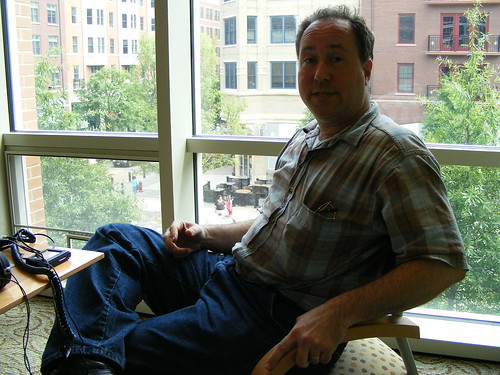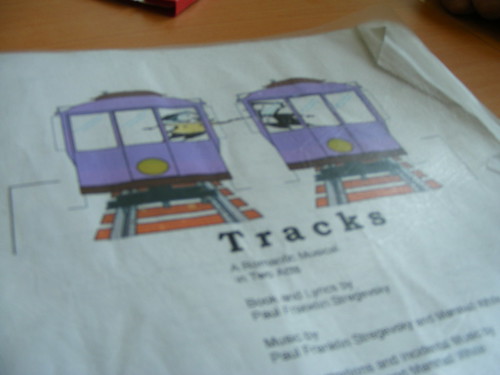part TWO of a series on writer Paul Stregevsky, currently working on a musical about the Purple Line. Check out part ONE | part THREE | part FOUR
 Paul Stregevsky, writer of a musical about the Purple Line, in the Rockville Library.
Paul Stregevsky, writer of a musical about the Purple Line, in the Rockville Library.
To research his subject, Stregevsky ditched a brief commute to his job in Rockville for a new job with Homeland Security in the District - and a grueling two-hour commute by bus and train each way. "If I'm gonna write about mass transit, I should take mass transit," he says. He was struck by how lonely his fellow commuters seemed, how "everyone seems to want to reach out to someone," and it became a driving factor in his work.
Switching to the MARC train gave Stregevsky even more inspiration. "The homeless came a part of this when I started taking the MARC train," he says. "There were a lot of homeless around [Union Station] begging for money, and I realized it was about class and not race."
 The cover of Tracks, the musical being written by Stregevsky, Marshall White and Jared Denhard.
The cover of Tracks, the musical being written by Stregevsky, Marshall White and Jared Denhard.
From there, he started looking at ways to deconstruct stereotypical notions of race and class through his characters. Duran Longshaw, the black protagonist, is a wealthy Republican - and his love interest is Helina, a homeless woman who sells flowers at the train station. It was an attempt to show "that the homeless don't have to be outcasts or pariahs," says Stregevsky. Meanwhile, Asian rider Peter Kim is described as "a skirt-chasing professor of Applied Mathematics" on the Tracks website. Feeling that Asian men are often overlooked by Asian women, Stregevsky hopes to "change that perception with Peter Kim," he says.
It's all just a reflection of how society's changing, Stregevsky explains. "People in your generation, you go to the mall, they mix all races," he says.
While the social issues of Tracks came close to the topic matter of recent musicals like Rent and movies like Crash, Stregevsky found them too jaded. Rent was "very gritty, very draining to watch," he says, while he calls Tracks "the 'anti-Crash'." And unlike Rent and Crash, who almost make their settings - 1980's New York and 2000-era Los Angeles, respectively - a character in the story, Stregevsky chose not to include a lot of local references in Tracks. Despite the musical's setting in suburban Maryland, he was concerned about making it "too Washingtonian if it's going to play elsewhere," he says. "But Oklahoma talks about Oklahoma," he concedes.
The twenty-four songs in Tracks poke fun at the daily routines of transit riders while also making social commentary. Riders Celia and Sholeh, who fall in love on the train, sing about "reaching out" in "Ordinary Day," which has the lines "talk with a stranger/ walk with a stranger/ reach out before you turn to clay." There are also songs about looking for love ("On Craigslist"), jockeying for a seat ("Third Car, Seventh Row"), making fun of riders who do work on the train ("Tapping On A Laptop") and one about Black inventors ("That's What We Do"), that Stregevsky hoped would appear in Black History month presentations at local high schools.
"I don't want to be cynical," says Stregevsky. "I'm prepared to be called naive . . . almost Oscar Hammerstein-ish."
While Stregevsky drew inspiration from older musicals - among them Brigadoon, Seven Brides for Seven Brothers, and Rodgers and Hammerstein’s Oklahoma - he shied away from the long-standing tradition of Jewish-themed musicals. "The world doesn't need another Jewish musical," says Stregevsky, who is Jewish. "This is a musical about the changing face of America."
 Paul Stregevsky, writer of a musical about the Purple Line, in the Rockville Library.
Paul Stregevsky, writer of a musical about the Purple Line, in the Rockville Library."Talk with a stranger, walk with a stranger, reach out before you turn to clay."In 1998, Stregevsky completed his first musical, Marriage At Work, about students in a night-school class for wrecked marriages. After it was met with limited success, he decided to do something bigger. "If I were ever to do a second musical, it would be greater than just two people coming together," he says. In 1997, he began with a series of essays, titled 'Connections.' Eight years and thirty-seven essays later, he'd written one called 'Rail Ties,' about people "reaching together" on Metro. Inspired, Stregevsky ran with it, writing his then-untitled musical "in earnest."
To research his subject, Stregevsky ditched a brief commute to his job in Rockville for a new job with Homeland Security in the District - and a grueling two-hour commute by bus and train each way. "If I'm gonna write about mass transit, I should take mass transit," he says. He was struck by how lonely his fellow commuters seemed, how "everyone seems to want to reach out to someone," and it became a driving factor in his work.
Switching to the MARC train gave Stregevsky even more inspiration. "The homeless came a part of this when I started taking the MARC train," he says. "There were a lot of homeless around [Union Station] begging for money, and I realized it was about class and not race."
 The cover of Tracks, the musical being written by Stregevsky, Marshall White and Jared Denhard.
The cover of Tracks, the musical being written by Stregevsky, Marshall White and Jared Denhard.From there, he started looking at ways to deconstruct stereotypical notions of race and class through his characters. Duran Longshaw, the black protagonist, is a wealthy Republican - and his love interest is Helina, a homeless woman who sells flowers at the train station. It was an attempt to show "that the homeless don't have to be outcasts or pariahs," says Stregevsky. Meanwhile, Asian rider Peter Kim is described as "a skirt-chasing professor of Applied Mathematics" on the Tracks website. Feeling that Asian men are often overlooked by Asian women, Stregevsky hopes to "change that perception with Peter Kim," he says.
It's all just a reflection of how society's changing, Stregevsky explains. "People in your generation, you go to the mall, they mix all races," he says.
While the social issues of Tracks came close to the topic matter of recent musicals like Rent and movies like Crash, Stregevsky found them too jaded. Rent was "very gritty, very draining to watch," he says, while he calls Tracks "the 'anti-Crash'." And unlike Rent and Crash, who almost make their settings - 1980's New York and 2000-era Los Angeles, respectively - a character in the story, Stregevsky chose not to include a lot of local references in Tracks. Despite the musical's setting in suburban Maryland, he was concerned about making it "too Washingtonian if it's going to play elsewhere," he says. "But Oklahoma talks about Oklahoma," he concedes.
The twenty-four songs in Tracks poke fun at the daily routines of transit riders while also making social commentary. Riders Celia and Sholeh, who fall in love on the train, sing about "reaching out" in "Ordinary Day," which has the lines "talk with a stranger/ walk with a stranger/ reach out before you turn to clay." There are also songs about looking for love ("On Craigslist"), jockeying for a seat ("Third Car, Seventh Row"), making fun of riders who do work on the train ("Tapping On A Laptop") and one about Black inventors ("That's What We Do"), that Stregevsky hoped would appear in Black History month presentations at local high schools.
"I don't want to be cynical," says Stregevsky. "I'm prepared to be called naive . . . almost Oscar Hammerstein-ish."
While Stregevsky drew inspiration from older musicals - among them Brigadoon, Seven Brides for Seven Brothers, and Rodgers and Hammerstein’s Oklahoma - he shied away from the long-standing tradition of Jewish-themed musicals. "The world doesn't need another Jewish musical," says Stregevsky, who is Jewish. "This is a musical about the changing face of America."

1 comment:
Stregevsky has to be commended for his effort to present a homeless character who isn't an outcast or pariah.
Homelessness can happen to anyone, as we should all remember in the current economic slump.
I do hope, however, that he will write at least one song about "disruptive assholes pissing off people". It only takes one such person per day to make someone like me permanently swear off riding Metrorail.
Let's see, for almost ten years, I refuse to ride Metro. One night out of those ten years, I lose my resolve, and ride Metro. What happens? I spent the next few months with a broken hand.
Feh. If Metrorail is the only way to get there, I'm not going.
Post a Comment